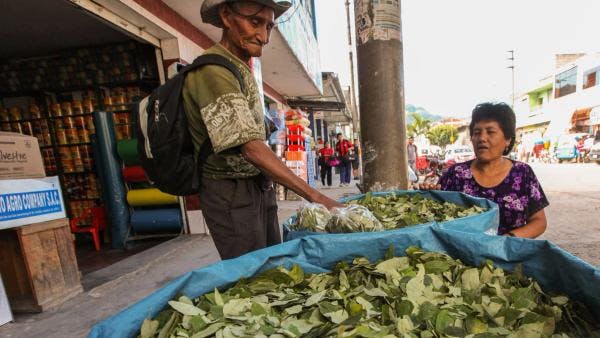haak78 - Shutterstock
Bolivia requests the UN to conduct a critical review of the classification of the coca leaf
As announced in Vienna at the 66th conference of the Commission on Narcotic Drugs in March this year by Jilata David Choquehuanca, the Plurinational State of Bolivia has activated the process to review the current classification of the coca leaf as a narcotic drug in Schedule I of the Single Convention on Narcotic Drugs. in Schedule I of the 1961 Single Convention on Narcotic Drugs through a critical review by the critical review by the World Health Organisation (WHO). (WHO).
In this regard, President Luis Arce Catacora sent a notification at the end of the month of June to the United Nations Secretary General, Antonio Guterres, in which Bolivia officially requested a critical review of the current classification of the coca leaf, which is at the core of the United Nations' treaty system on drug control, and based on an inadequate and inconsistent classification of the coca leaf, which places it in Schedule 1. This classification transgresses all the procedures and scientific pharmacological studies established for the classification of narcotic drugs, thus violating the legitimate rights, culture and ancestral medicine that Bolivia enjoys.
The Plurinational State has submitted, as an annex to the formal notification, a document of objective support to overcome the aspects of incoherence linked to the classification and classification of the coca leaf in the context of the international legal framework and in the light of dozens of scientific investigations.
The main objectives, arguments and procedure are summarised below.
Objectives
The initiative is aimed at redressing a historic wrong in the UN drug control regime by exercising Bolivia's right as all Parties to challenge the scheduling of substances, in this case, the inclusion of coca leaf in Schedule I following the procedure set out in the 1961 Convention.
The intention is to obtain a WHO assessment based on scientific evidence that the coca leaf does not cause harm to the human organism or dependence, being on the contrary a species that has multiple beneficial uses.
This recognition is fundamental to expand the legal market space for coca products in their natural form, such as coca tea among many others. The current restrictions imposed by the Convention hinder the potential international market for coca products, which could benefit the peasant communities that practice coca cultivation and offer the international community the benefits of a plant with medicinal and nutritional properties with a millenary tradition in the Andean-Amazon region.
It is also hoped that this initiative will contribute to a necessary reflection on the inconsistencies and injustices that persist in the current international drug control regime. A change in the classification of coca leaf would not mean a change in the necessary control of cocaine. Therefore, coca cultivation for cocaine production will continue to be subject to the rules of the control system of the international treaties and our national legislation.
Rationale
The inclusion of coca leaf in Schedule I of the 1961 Convention was based on the 1950 Report of the Coca Leaf Study Commission. The WHO never assessed its classification under the criteria set out in the treaty and in the WHO Guidelines for the Review of Psychoactive Substances. Efforts by Andean countries to challenge it resulted in several national reservations and exceptions, but failed to change the classification of the coca leaf and the treaty obligation to eliminate its traditional uses. The legal conflict between the obligations of the 1961 Convention and cultural and indigenous rights has been pointed out by the High Commissioner for Human Rights and the Permanent Forum on Indigenous Issues on several occasions. Since the Political Constitution of 2009, the Plurinational State of Bolivia has the obligation to protect the original and ancestral coca leaf as a heritage and renewable natural resource of our biodiversity with a central role in the Andean-Amazonian cultures.
Procedure
Pursuant to Article 3 of the 1961 Single Convention, any Member State may notify the Secretary-General of the United Nations, providing the data on which the request is based. Subsequently, the WHO Expert Committee on Drug Dependence prepares a critical review document with scientific information on pharmacological properties, toxicology, abuse and harmful effects, magnitude of public health problems, medical uses, therapeutic applications, and ease of transformation into other controlled substances. On the basis of this report, the Committee of Experts assesses whether the current classification of coca leaf should be maintained, or may recommend its removal from the Convention or its transfer to another of its Schedules. Subsequently, the Commission on Narcotic Drugs decides by vote (simple majority) whether to approve the WHO recommendation, a decision that can be reconsidered by the Economic and Social Council (ECOSOC) by at least two-thirds. It is estimated that the process will take close to two years before a conclusion is reached.
Bolivia has also requested that the WHO Expert Committee should be complemented by experts specialised in natural and traditional medicine, as well as in indigenous peoples' law.
Finally, the Plurinational State of Bolivia invites the member countries of the 1961 Single Convention on Narcotic Drugs to accompany the process of critical review of the current classification of the Coca leaf in Schedule 1, which Bolivia has initiated in the light of current scientific evidence, objective and verifiable methodologies of the technical-scientific entity of the World Health Organisation and the Expert Committee on Drug Dependence.
